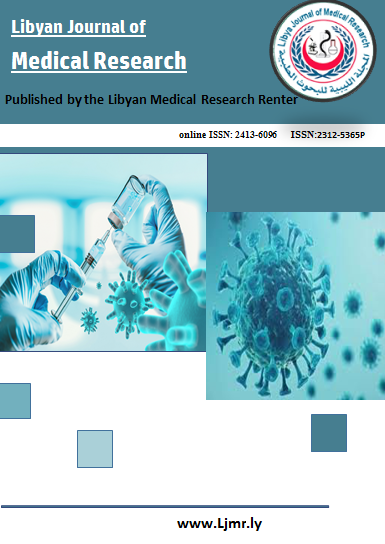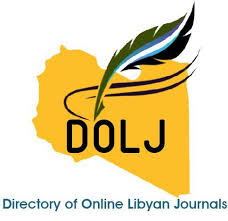Assessment of knowledge about tuberculosis among nurses in Misurata, Libya
DOI:
https://doi.org/10.54361/LJMR.19.1.17Keywords:
tuberculosis, assessment, knowledge, nurses, LibyaAbstract
Background: Nurses make up by far the largest group of healthcare workers in any part of the world and have an important role to play in the direct management of tuberculosis (TB) patients and consequently face a high risk of infection. The aim of this study was to assess the knowledge about TB disease among nurses in Misurata, Libya.
Methodology: The study was conducted among 396 nurses working in two public hospitals and five district primary healthcare centres in the province of Misurata, Libya. A validated self-administered questionnaire was used to investigate the nurses’ level of knowledge on TB.
Results: Out of the participants, 152 (38.4%) were male and 244 (61.6%) were female. The majority of the participants were in the 26–40 years age group. The results revealed that the overall level of knowledge about the TB disease was poor as only one-fifth (21%) of the nurses gave the correct responses regarding TB symptoms, transmission, risk factors, diagnosis and treatment. The level of knowledge about the prevention of TB was significantly higher among nurses who held a bachelor degree compared to others (p = 0.007). Conclusion: Most of the nurses who participated in this study were lacking in knowledge on TB. Active educational interventions, such as regular TB awareness programmes in hospitals, are required to improve knowledge about TB. Also, the nursing programme curriculum should be revised and updated in Libya to better prepare nurses to deal with incidences of TB.
Downloads
References
Organization, W.H., The global plan to stop TB, 2006-2015. 2006, World Health Organization.
Cusick, A. and R.M. Hamed El Sahly, People with disability in Libya are a medicalised minority: Findings of a scoping review. 2018.
Harries, A.D., D. Maher, and P. Nunn, Practical and affordable measures for the protection of health care workers from tuberculosis in low-income countries. Bulletin of the World Health Organization, 1997. 75(5): p. 477.
Yükseltürk, N. and L. Dinç, Knowledge about anti‐tuberculosis treatment among nurses at tuberculosis clinics. International Journal of Nursing Practice, 2013. 19(1): p. 47-53.
Akin, S., et al., Knowledge of and attitudes toward tuberculosis of Turkish nursing and midwifery students. Nurse education today, 2011. 31(8): p. 774-779.
Woith, W.M., G. Volchenkov, and J.L. Larson, Russian health care workers' knowledge of tuberculosis and infection control [Notes from the field]. The international journal of tuberculosis and lung disease, 2010. 14(11): p. 1489-1492.
White, Z.N., Survey on the knowledge, attitudes and practices on Tuberculosis (TB) among health care workers in Kingston and St. Andrew, Jamaica. Unpublished Master of Public Health dissertation in The University of Liverpool, UK, 2011.
Farhanah, A.W., et al., Updates on knowledge, attitude and preventive practices on tuberculosis among healthcare workers. Malaysian Journal of Medical Sciences, 2016. 23(6): p. 25-34.
Hashim, D., W. Al Kubaisy, and A. Al Dulayme, Knowledge, attitudes and practices survey among health care workers and tuberculosis patients in Iraq. EMHJ-Eastern Mediterranean Health Journal, 9 (4), 718-731, 2003, 2003.
Baussano, I., et al., Tuberculosis among health care workers. Emerging infectious diseases, 2011. 17(3): p. 488.
Zwerling, A., et al., TB screening in Canadian health care workers using interferon-gamma release assays. 2012.
Moustafa AF, A., et al., Prevalence of latent TB among health care workers in four major tertiary care hospitals in Riyadh, Saudi Arabia. 2010.
He, G.X., et al., Infection control and the burden of tuberculosis infection and disease in health care workers in china: a cross-sectional study. BMC infectious diseases, 2010. 10: p. 1-9.
Drobniewski, F., et al., Rates of latent tuberculosis in health care staff in Russia. PLoS medicine, 2007. 4(2): p. e55.
Singla, N., P. Sharma, and R. Jain, Awareness about tuberculosis among nurses working in a tuberculosis hospital and in a general hospital in Delhi, India. The International Journal of Tuberculosis and Lung Disease, 1998. 2(12): p. 1005-1010.
Mussi, T.V.F., M.C. Traldi, and J.N.d.S. Talarico, Knowledge as a factor in vulnerability to tuberculosis among nursing students and professionals. Revista da Escola de Enfermagem da USP, 2012. 46: p. 696-703.
Tachfouti, N., et al., The impact of knowledge and attitudes on adherence to tuberculosis treatment: a case-control study in a Moroccan region. Pan African Medical Journal, 2012. 12(1).
Wu, P.-S., et al., Assessment of changes in knowledge and stigmatization following tuberculosis training workshops in Taiwan. Journal of the Formosan Medical Association, 2009. 108(5): p. 377-385.
Naidoo, S., et al., Changes in Healthcare Workers′ Knowledge about Tuberculosis Following a Tuberculosis Training Programme. Education for Health, 2011. 24(2): p. 514.
Downloads
Published
Issue
Section
License
Copyright (c) 2025 Muftah Abdulssalam Elbahloul , Khadija Ali Amer, Hussien A. Elaswdi, Abdallah Elgenaidi, Osama H. Almajdoub (Author)

This work is licensed under a Creative Commons Attribution-NonCommercial-NoDerivatives 4.0 International License.
Open Access Policy
Libyan journal of medical Research (LJMR).is an open journal, therefore there are no fees required for downloading any publication from the journal website by authors, readers, and institution.
The journal applies the license of CC BY (a Creative Commons Attribution 4.0 International license). This license allows authors to keep ownership f the copyright of their papers. But this license permits any user to download , print out, extract, reuse, archive, and distribute the article, so long as appropriate credit is given to the authors and the source of the work.
The license ensures that the article will be available as widely as possible and that the article can be included in any scientific archive.
Editorial Policy
The publication of an article in a peer reviewed journal is an essential model for Libyan journal of medical Research (LJMR). It is necessary to agree upon standards of expected ethical behavior for all parties involved in the act of publishing: the author, the journal editorial, the peer reviewer and the publisher.
Any manuscript or substantial parts of it, submitted to the journal must not be under consideration by any other journal. In general, the manuscript should not have already been published in any journal or other citable form, although it may have been deposited on a preprint server. Authors are required to ensure that no material submitted as part of a manuscript infringes existing copyrights, or the rights of a third party.
Authorship Policy
The manuscript authorship should be limited to those who have made a significant contribution and intellectual input to the research submitted to the journal, including design, performance, interpretation of the reported study, and writing the manuscript. All those who have made significant contributions should be listed as co-authors.
Others who have participated in certain substantive aspects of the manuscript but without intellectual input should only be recognized in the acknowledgements section of the manuscript. Also, one of the authors should be selected as the corresponding author to communicate with the journal and approve the final version of the manuscript for publication in the LJMR.
Peer-review Policy
- All the manuscripts submitted to LJMR will be subjected to the double-blinded peer-review process;
- The manuscript will be reviewed by two suitable experts in the respective subject area.
- Reports of all the reviewers will be considered while deciding on acceptance/revision or rejection of a manuscript.
- Editor-In-Chief will make the final decision, based on the reviewer’s comments.
- Editor-In-Chief can ask one or more advisory board members for their suggestions upon a manuscript, before making the final decision.
- Associate editor and review editors provide administrative support to maintain the integrity of the peer-review process.
- In case, authors challenge the editor’s negative decision with suitable arguments, the manuscript can be sent to one more reviewer and the final decision will be made based upon his recommendations.














